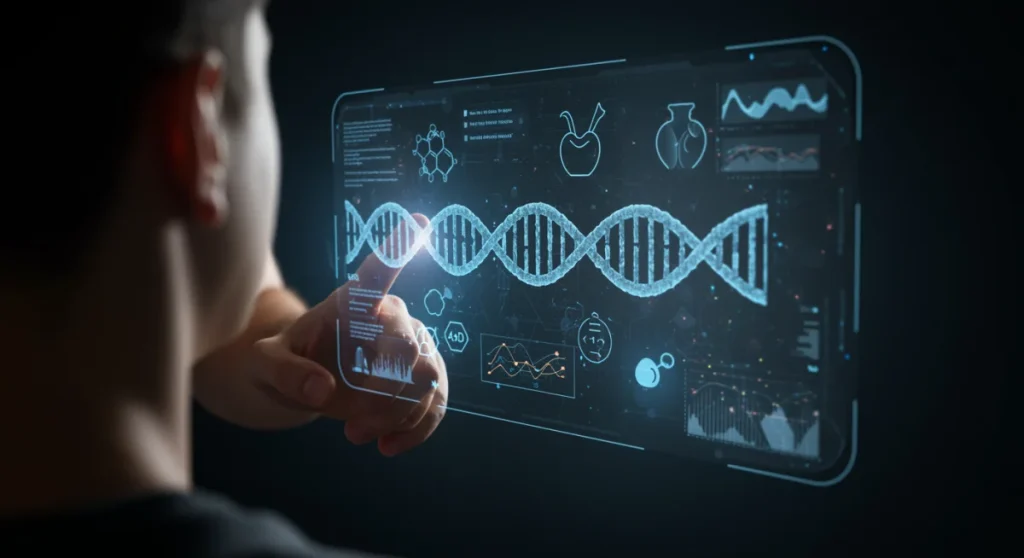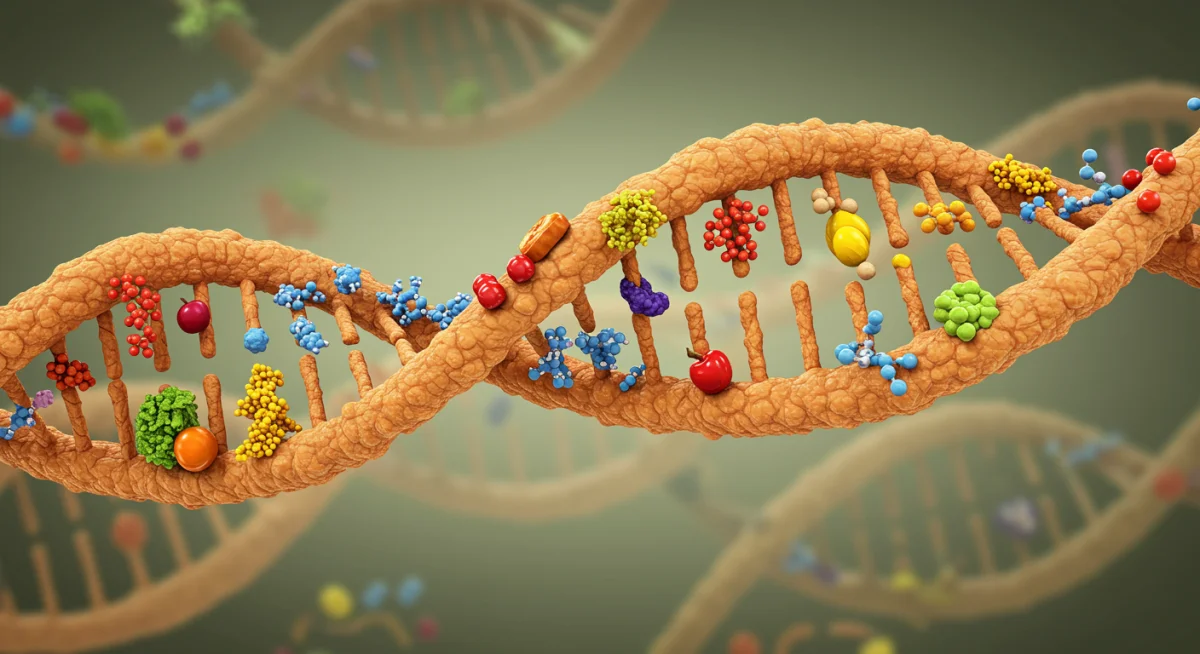Personalized Nutrition in 2025: Genetic Testing Insights

Personalized nutrition in 2025, driven by genetic testing, revolutionizes dietary advice by providing highly individualized health strategies based on unique genetic profiles, moving beyond traditional generalized recommendations.
As we navigate 2025, the landscape of dietary advice is undergoing a profound transformation, largely thanks to advancements in genetic testing. The concept of personalized nutrition in 2025 is no longer a futuristic dream but a tangible reality, offering tailored dietary recommendations that align perfectly with an individual’s unique genetic makeup.
The rise of nutrigenomics in dietary science
Nutrigenomics, the study of how nutrients affect gene expression, has emerged as a cornerstone of personalized nutrition. This field explores the intricate relationship between our diet and our genes, revealing how specific foods can influence our health at a molecular level.
Understanding these interactions allows for highly targeted dietary interventions, moving beyond the traditional one-size-fits-all approach to nutrition. In 2025, nutrigenomics is not just an academic pursuit; it’s a practical tool for everyday health management.
Genetic predispositions and dietary responses
Every individual possesses a unique genetic code that influences how their body processes and responds to different nutrients. Some people might be genetically predisposed to metabolize caffeine slowly, while others may have a higher risk of vitamin deficiencies despite adequate intake. Genetic testing helps identify these predispositions.
- Caffeine sensitivity: Genetic variations in the CYP1A2 gene can determine how quickly an individual metabolizes caffeine, affecting their response to coffee and other caffeinated beverages.
- Lactose intolerance: The LCT gene variant is a common indicator of lactose persistence or intolerance, guiding dairy consumption recommendations.
- Vitamin D metabolism: Genes like VDR and CYP2R1 influence how the body synthesizes and utilizes vitamin D, impacting supplementation strategies.
These genetic insights enable dietitians and healthcare providers to offer precise dietary advice, optimizing nutrient intake and mitigating potential health risks based on an individual’s genetic blueprint. The goal is to maximize health outcomes by aligning dietary choices with genetic predispositions.
In essence, nutrigenomics provides the scientific foundation for truly personalized dietary recommendations. By analyzing an individual’s genetic profile, we can unlock a deeper understanding of their nutritional needs and sensitivities, paving the way for more effective and sustainable health strategies.
Accessibility and accuracy of genetic testing in 2025
The year 2025 marks a significant milestone in the accessibility and accuracy of genetic testing for nutritional purposes. What was once a niche, expensive service is now becoming widely available and more affordable, making personalized nutrition a reality for a broader population.
Technological advancements have streamlined the testing process, from sample collection to data analysis, ensuring reliable and actionable results that empower individuals to make informed dietary choices.
Home-based genetic testing kits
The proliferation of direct-to-consumer genetic testing kits has dramatically increased public access to genetic insights. These kits typically involve a simple saliva sample collected at home, which is then sent to a lab for analysis. The results often include reports on genetic predispositions related to diet, exercise, and overall health.
- Ease of use: Simple, non-invasive sample collection.
- Affordability: Reduced costs compared to clinical genetic tests.
- Convenience: Results delivered directly to the consumer, often through user-friendly online platforms.
While these kits offer a convenient starting point, it’s crucial to interpret the results with the guidance of qualified professionals to ensure accuracy and avoid misinterpretation. The raw genetic data, when combined with expert nutritional counseling, forms the basis for a truly personalized dietary plan.
Beyond home kits, clinical genetic testing has also seen improvements in precision and comprehensiveness. These tests often delve deeper into specific health markers and offer more detailed insights, particularly for individuals with complex health conditions or specific dietary needs. The synergy between accessible home testing and advanced clinical options ensures a robust framework for personalized nutritional guidance.
Integrating AI and machine learning for dietary recommendations
The sheer volume of data generated by genetic testing, coupled with an individual’s lifestyle and health metrics, necessitates sophisticated analytical tools. In 2025, artificial intelligence (AI) and machine learning (ML) are indispensable in translating complex genetic information into practical, personalized dietary recommendations.
These technologies can process vast datasets, identify intricate patterns, and predict optimal dietary strategies with a level of precision that human analysis alone cannot achieve. This integration marks a new era in nutritional science, where data-driven insights lead to highly effective health outcomes.
Predictive modeling for nutritional responses
AI algorithms are now capable of predictive modeling, anticipating how an individual might respond to certain foods or dietary patterns based on their genetic profile and other relevant data. This goes beyond simply identifying predispositions; it involves forecasting specific outcomes and recommending proactive interventions.
For example, an AI system can analyze a person’s genetic markers for inflammation, combine it with their current dietary habits, and suggest specific anti-inflammatory foods or supplements, along with potential adverse reactions to certain pro-inflammatory ingredients.
The continuous learning capabilities of ML models mean that as more data is collected and analyzed, the accuracy and efficacy of these personalized recommendations improve over time. This iterative process allows for constant refinement and adaptation of dietary plans, ensuring they remain relevant and effective as an individual’s health status or goals evolve.

Furthermore, AI-powered platforms can integrate data from wearables, continuous glucose monitors, and other health tracking devices, providing a holistic view of an individual’s physiological responses to their diet. This comprehensive data integration enables a dynamic and responsive approach to personalized nutrition, constantly optimizing dietary strategies for peak performance and well-being.
Ethical considerations and data privacy in genetic nutrition
As genetic testing becomes more prevalent, the ethical implications and concerns surrounding data privacy come sharply into focus. The sensitive nature of genetic information demands robust safeguards and transparent practices to protect individuals’ personal data.
In 2025, regulatory frameworks and industry best practices are evolving to address these concerns, ensuring that the benefits of personalized nutrition can be realized without compromising individual privacy or fostering discrimination.
Ensuring data security and consent
Companies offering genetic testing and personalized nutrition services are increasingly implementing advanced encryption and cybersecurity measures to protect genetic data from breaches. Beyond technical safeguards, clear and explicit consent mechanisms are paramount.
- Informed consent: Individuals must fully understand how their genetic data will be used, stored, and shared before providing consent.
- Anonymization: Data should be anonymized whenever possible to prevent re-identification, especially for research purposes.
- Data access control: Strict controls should be in place to limit who can access genetic data and under what circumstances.
The regulatory landscape is also adapting, with laws like GDPR and HIPAA serving as foundational models for genetic data protection. New legislation specifically addressing genetic privacy is being developed to keep pace with technological advancements and evolving ethical standards.
Transparency from genetic testing companies regarding their data handling policies is crucial for building consumer trust. Individuals need to feel confident that their most personal information is being managed responsibly and ethically. The long-term success and widespread adoption of personalized nutrition depend heavily on maintaining these high standards of privacy and ethical conduct.
The role of healthcare professionals in personalized dietary plans
While genetic testing and AI provide powerful insights, the expertise of healthcare professionals remains indispensable in translating this information into actionable and safe personalized dietary plans. Dietitians, nutritionists, and doctors play a critical role in interpreting complex genetic data, considering individual health history, and providing holistic guidance.
Their involvement ensures that personalized nutrition is not just scientifically sound but also practical, sustainable, and integrated into an individual’s broader health strategy.
Collaborative approach to nutritional counseling
In 2025, a collaborative approach is becoming the norm. Genetic counselors explain the genetic findings, while registered dietitians develop the actual meal plans and provide ongoing support. Physicians oversee the overall health context, ensuring that dietary recommendations align with any existing medical conditions or treatments.
This multidisciplinary team ensures that individuals receive comprehensive care that addresses their unique needs from multiple perspectives. The human element of empathy, motivation, and personalized coaching remains vital, complementing the data-driven insights from genetic tests.

Healthcare professionals also play a crucial role in educating patients about the limitations of genetic testing and the importance of lifestyle factors beyond genetics. While genes provide a blueprint, environmental factors, stress, sleep, and physical activity all profoundly influence health outcomes. A balanced approach integrates all these elements.
Ultimately, the partnership between cutting-edge technology and human expertise is what makes personalized nutrition truly effective and safe. It ensures that dietary plans are not only genetically informed but also holistically tailored to support long-term health and well-being.
Future trends and advancements in personalized nutrition
Looking ahead, the field of personalized nutrition is poised for even greater innovation beyond 2025. Emerging technologies and deeper scientific understanding promise to make dietary recommendations even more precise, dynamic, and integrated into our daily lives.
From real-time biomarker monitoring to advanced microbiome analysis, the future holds exciting possibilities for optimizing human health through highly individualized nutritional strategies.
Real-time biomarker monitoring and dynamic dietary adjustments
One of the most promising future trends is the integration of real-time biomarker monitoring with genetic insights. Imagine continuous glucose monitors, wearable sensors tracking metabolic responses, and even smart toilets analyzing microbiome health, all feeding data into an AI system that dynamically adjusts your personalized diet plan.
This real-time feedback loop would allow for immediate dietary modifications based on how your body is responding at any given moment, moving beyond static recommendations to truly adaptive nutrition.
- Continuous glucose monitoring: Offers immediate feedback on how different foods impact blood sugar levels, allowing for precise carbohydrate management.
- Wearable metabolic sensors: Track calorie expenditure, fat burning, and other metabolic markers to optimize energy intake and macronutrient ratios.
- Gut microbiome analysis: Advanced sequencing technologies will provide deeper insights into the gut microbiota, guiding probiotic and prebiotic recommendations for optimal gut health.
Furthermore, advancements in epigenetics, the study of how environmental factors (including diet) can turn genes on or off, will add another layer of sophistication to personalized nutrition. Understanding these epigenetic modifications will allow for dietary interventions that not only align with genetic predispositions but also actively influence gene expression for improved health outcomes.
The convergence of genomics, AI, and real-time physiological monitoring will create a truly intelligent and responsive personalized nutrition ecosystem, offering unparalleled opportunities for optimizing health, preventing disease, and enhancing overall quality of life.
Challenges and considerations for widespread adoption
While the promise of personalized nutrition is immense, its widespread adoption faces several challenges that need to be addressed. These include the cost of testing, ethical dilemmas, regulatory gaps, and the need for greater public education and understanding.
Overcoming these hurdles will be crucial for ensuring that personalized nutrition benefits everyone, not just a select few, and integrates seamlessly into mainstream healthcare and lifestyle practices.
Cost, equity, and public education
Despite decreasing costs, genetic testing can still be a financial barrier for many. Ensuring equitable access to personalized nutrition services is vital to prevent exacerbating health disparities. Subsidies, insurance coverage, and scalable, affordable testing options are necessary to make these services accessible to all socioeconomic groups.
Another significant challenge is public education. Many people still have limited understanding of genetics and how it relates to diet. Clear, accurate, and accessible information is needed to help individuals make informed decisions about genetic testing and personalized nutrition.
- Regulatory harmonization: Developing consistent and robust regulatory frameworks for genetic testing and personalized nutrition products across different regions.
- Standardization of data: Establishing common standards for genetic data collection, analysis, and interpretation to ensure consistency and interoperability among providers.
- Professional training: Equipping healthcare professionals with the necessary knowledge and skills to interpret genetic data and apply it effectively in nutritional counseling.
Addressing these challenges requires a concerted effort from policymakers, healthcare providers, scientists, and the industry. By fostering collaboration and prioritizing ethical considerations, we can pave the way for a future where personalized nutrition is a cornerstone of public health, empowering individuals to take proactive control of their well-being.
| Key Aspect | Brief Description |
|---|---|
| Nutrigenomics Core | The science linking diet and gene expression, foundational for tailored nutritional advice. |
| Genetic Testing Access | Increased availability and affordability of tests, including home kits, enhancing personalized guidance. |
| AI Integration | AI and ML analyze vast genetic data to provide precise, predictive dietary recommendations. |
| Ethical Considerations | Focus on data privacy, consent, and equitable access crucial for public trust and adoption. |
Frequently asked questions about personalized nutrition in 2025
Personalized nutrition in 2025 involves creating dietary recommendations tailored to an individual’s unique genetic makeup, lifestyle, and health goals. It utilizes advanced genetic testing and AI to move beyond general dietary advice, focusing on what works best for your specific body.
Genetic tests for diet recommendations in 2025 are highly accurate, especially when interpreted by qualified professionals. While direct-to-consumer kits offer good insights, clinical tests provide deeper analysis. Combining genetic data with lifestyle factors ensures comprehensive and reliable dietary guidance.
No, personalized nutrition is beneficial for everyone, not just athletes or those with specific health conditions. It aims to optimize overall health, prevent disease, and enhance well-being for any individual by aligning their diet with their unique biological needs and predispositions.
AI and machine learning are critical for processing the vast amounts of data from genetic tests, lifestyle metrics, and health records. They identify patterns, predict responses to foods, and generate precise, dynamic dietary recommendations that would be impossible for humans to compute manually.
Key privacy concerns include the security of sensitive genetic data, how companies use and share this information, and the potential for discrimination. Robust encryption, clear consent policies, and evolving regulations are essential to protect individual privacy and build trust in this field.
Conclusion
The journey into personalized nutrition in 2025 reveals a transformative era where genetic testing is not just a scientific curiosity but a practical tool reshaping dietary recommendations. By integrating insights from nutrigenomics, leveraging advanced AI, and ensuring rigorous ethical standards, we are moving towards a future where diet is truly tailored to the individual. This shift promises unprecedented opportunities for optimizing health, preventing disease, and enhancing overall well-being, marking a significant leap forward in our understanding of food’s profound impact on our lives.





